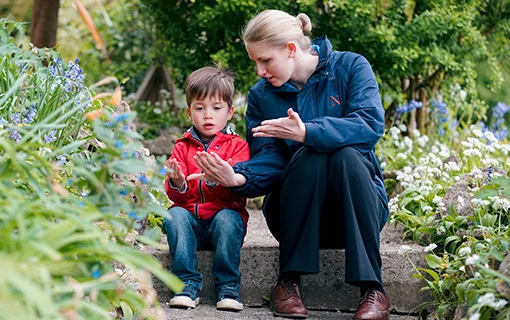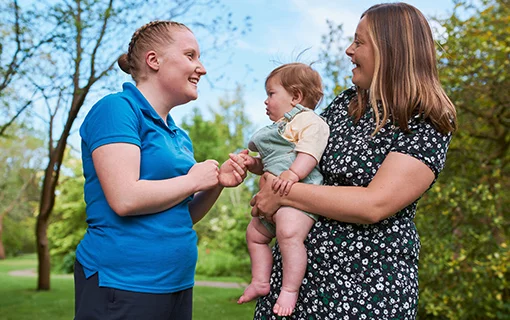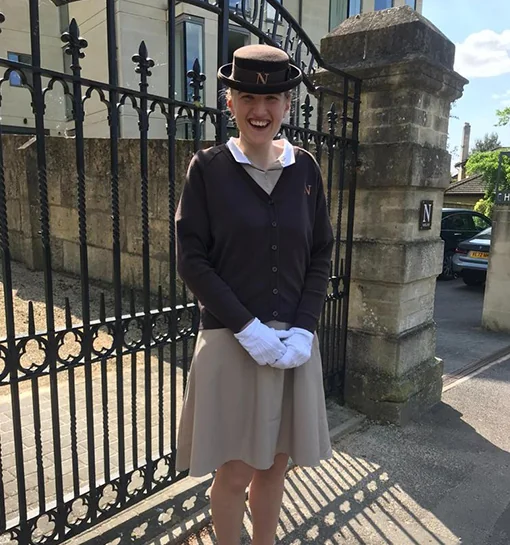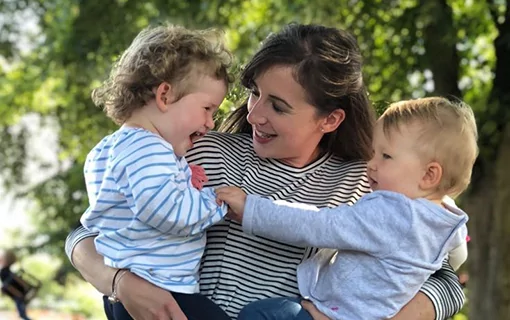Supporting young children through bereavement
9 September 2022

Norlander Julia Gaskell, Head of Careers and Consultancy, and Katie Crouch, Senior Lecturer in the Early Years, have put together some tips below to help parents and caregivers navigate what can be a difficult and sensitive topic.
As a nation, we are grieving and mourning the loss of our Queen. She was our Queen and was held in fondness and admiration by so many. We may be experiencing a range of emotions – sadness, shock, grief, a sense of loss. It may feel confusing when experiencing the death of someone who we may not have had the honour to know personally. However, when the death of a high-profile figure occurs, it can draw parallels with a personal bereavement.
Queen Elizabeth II was a common figure in all of our lives. You may be aware of changes that have already taken place around you as a sign of respect. For example, the media has changed their schedules, logos and symbolism, so this is something which will surround us all for the coming days, weeks and months.
With the Platinum Jubilee celebrations over the summer, many children will be highly aware of the Queen, her life, her sacrifices in line with her position, her care for the nation and the Commonwealth. Therefore, our children are likely to be experiencing the same emotions as adults during this time. They will probably have questions and wonder why they may be feeling such a range of challenging emotions. Grief has an emotional and a physical impact upon us all, so it is important to think about how we speak with children about this and the words we use.

Acknowledging loss
It is important to acknowledge the loss to the child without trying to avoid the subject – which can be difficult if you are also grieving. Words like ‘death’ and ‘died’ can feel unsafe for us, as adults, due to the finality of their meaning. However, children need specific, clear and direct wording which will help to build their understanding.
As adults, it is natural that we would want to prevent children from being upset and we may feel that using less finite words will help them. But phrases such as ‘passed away’, ‘went to sleep’. ‘in the stars’ or ‘no longer with us’ can cause many conflicting thoughts, misunderstandings and concerns for children. So it is better to say something like: “The Queen has died. Everything that lives, dies one day. Death means that it is the end of living”. Avoid adding too much information as they may become confused and may not want to have that much information about what’s happened. Share information in small doses.
It is important for children and adults to feel safe in talking about how they are feeling. Conversations around the death of someone can take place in ways which may help us to feel safer. Depending upon the age and understanding of the child, we could ask the child to draw a picture, make a card or write a letter to the person who has died, or even go for a walk together. We can then use this time to ask them about what they know and how they are feeling. This is when we can use our emotion words to model to our children that is it ok and normal to be feeling this way.
Statements such as, “I haven’t met the Queen, but I feel sad,” are a good way to open the conversation with children. You might also say “it’s normal to feel sad when someone dies”. This would be a good opportunity then for children to explore their emotions and how they are feeling. We can help them by providing language and a safe environment for them to do this. While it might seem that you are prolonging the agony, you are in fact allowing those feelings to be aired and acknowledged in a safe way with you. This is called Emotion Coaching.

Tips for 18-month-olds upwards
An 18-month to two-year-old might be aware of the altered dynamics in the family because whatever happens in a family affects all of the children. For example, a two-year-old may be too young to be fully aware of the loss but are likely to pick up on changes in tone in the conversations within the family. Children will soon sense if there is a different atmosphere in the house or notice you acting differently. Lots of physical reassurance, in a way which they usually prefer, is great at this time as they will also feel that they are giving comfort alongside receiving comfort from you.
A five to eight-year-old is starting to understand that death is permanent and forever. There are many great children’s books that can support children through bereavement in whatever form it may take. Forever and Always by Alan Durant and Badger’s Parting Gift by Susan Varley, for example, are good for young children.
At nine years plus, they have a much better understanding of the finality of death and they may get more curious about the physical aspects of it. Being aware of different children’s knowledge and understanding of death helps us to predict in what ways they need more support.
Through books like Michael Rosen’s Sad and the range of Little Feelings books by Campbell, we can support our children to begin to understand their emotions and how they are feeling during these difficult times. We could use the cards, pictures and letters as a way of celebrating our Queen, her service and her achievements.

Maintaining routines
It is important to remember that all behaviour in children is a form of communication, so always view behaviour as an iceberg – you see what’s at the top but something bigger might be going on underneath. Is the child expressing frustration and anger because they feel confused by their feelings of sadness?
If the child has experienced a personal bereavement before, such as a close family member or friend, this may be even more challenging for them to process and manage. It is easy to draw parallel feelings with our own personal experiences. The physical cues and media may trigger previous memories and feelings. Winston’s Wish has some wonderful, free resources which can help during this time.
Try to keep to their routines as much as possible as this helps them to feel safe and to feel that life goes on. Our brains prefer predictability wherever possible, especially when the world around us is changing.
An analogy we use is that to begin with, the grief may be huge; it fills you all up. As you come to terms with it, it may get smaller but it may never go away. With time, love, patience, support and discussion, we can help ourselves and those around us to come to terms with the death of a loved one and support them through the loss of someone we feel we know.
Love Never Faileth.








